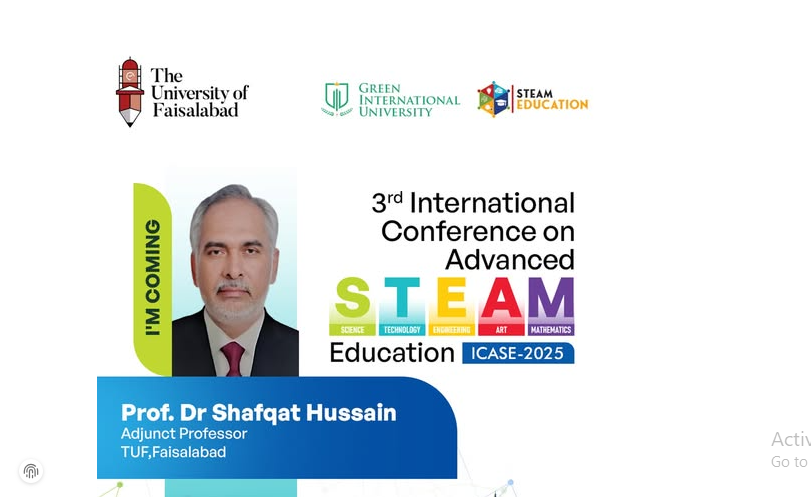Challenges in Advanced STEAM Education
The rapid evolution of science, technology, engineering, arts, and mathematics (STEAM) education has created unparalleled opportunities for innovation in teaching and learning. However, integrating advanced STEAM approaches in classrooms remains complex due to curriculum limitations, technological gaps, and teacher readiness. Addressing these challenges was the focus of a dedicated session at the STEAM Conference 2025, held in Room 001, Venue 4, under the Education track.
The session was chaired by Prof. Dr Shafqat Hussain (GC University, Faisalabad), who highlighted the urgent need for evidence-based strategies to ensure that STEAM programs enhance creativity, critical thinking, and problem-solving skills among students. Co-Chair Dr Muhammad Obaid Aslam (The University of Faisalabad) emphasised that research-driven insights into teacher preparedness, student engagement, and technological integration are essential for achieving successful STEAM adoption in Pakistan’s schools.
Keynote Insight: STEAM-Based E-Learning Adoption – Muhammad Sarwar (The Superior University, Lahore)
The session opened with an invited talk by Muhammad Sarwar, who presented a quantitative study on the opportunities and challenges in adopting STEAM-based e-learning in Pakistan. He noted that while digital tools and virtual labs offer tremendous potential, barriers such as inadequate infrastructure, low teacher confidence, and socio-economic disparities hinder effective implementation. His insights provided a strong foundation for subsequent discussions on evidence-based solutions to advance STEAM education.
Invited Talks Highlighting Challenges and Innovations in STEAM
Misconceptions in Physics within a STEAM Framework – Habib Ullah (The University of Faisalabad)
Habib Ullah presented a psychometrically validated five-tier diagnostic test designed to identify and address misconceptions in physics. His research underscored the importance of diagnostic tools in helping teachers target conceptual gaps, ensuring that advanced STEAM curricula effectively build student understanding and analytical thinking.
Advanced STEAM Skills and Student Creativity – Muhammad Shahzad & Muhammad Shoaib Anjum (The University of Faisalabad)
The duo explored the relationship between students’ advanced STEAM skills and their creative outcomes at the secondary level. Their findings revealed that integrating hands-on experiments, problem-solving activities, and interdisciplinary projects significantly enhances students’ creativity—a core objective of STEAM education.
AI-Driven Professional Development for Teachers – Muhammad Azeem Sarwar (The University of Faisalabad)
Muhammad Azeem Sarwar discussed how artificial intelligence can optimise teacher training and professional development in STEAM disciplines. AI-driven platforms can provide personalised feedback, adaptive lesson plans, and real-time assessment, empowering educators to adopt 21st-century teaching practices effectively.
Integrating STEAM in Primary Classrooms – Saima (The University of Faisalabad)
Saima presented both challenges and opportunities in applying advanced STEAM approaches at the primary level. Her research emphasised the need for age-appropriate materials, teacher mentorship programs, and interactive learning experiences that encourage curiosity while maintaining foundational literacy and numeracy standards.
Transformational Leadership and STEAM Practices – Ishfaq Ahmed (The University of Faisalabad)
Ishfaq Ahmed highlighted the role of school leadership in supporting STEAM initiatives. He demonstrated that transformational leadership styles positively influence teacher engagement, adoption of STEAM-based instructional practices, and overall student performance.
Effectiveness of Online STEAM Learning Platforms – Afshan Gul (The University of Faisalabad)
Afshan Gul provided a critical review of online STEAM learning platforms, analysing how digital tools impact student engagement, knowledge retention, and collaborative problem-solving. Her findings indicated that platform design, teacher facilitation, and student interactivity are key determinants of e-learning success in STEAM education.
Impact of STEAM Instructional Approaches – Ms Misbah Rehman (The University of Faisalabad)
Ms Misbah Rehman concluded the session by presenting empirical evidence on the impact of STEAM instructional methods on student performance. Her research highlighted improved academic outcomes, higher-order thinking skills, and increased motivation among students exposed to interdisciplinary STEAM approaches.
Why Addressing STEAM Challenges Matters
The session highlighted that advancing STEAM education in Pakistan requires a holistic approach that addresses:
- Teacher training and professional development
- Integration of AI and digital learning tools
- Age-appropriate, hands-on, and interdisciplinary instructional strategies
- Strong leadership support and school governance
- Continuous assessment and evaluation frameworks
By tackling these challenges, schools can ensure that STEAM education not only improves academic performance but also nurtures creativity, problem-solving skills, and lifelong learning.
Conclusion
The session reinforced a key message: successful STEAM education depends on research-driven strategies, technological integration, and teacher empowerment. Guided by Prof. DDrShafqat Hussain and Dr Muhammad Obaid Aslam (The University of Faisalabad) and enriched by insights from Muhammad Sarwar, Habib Ullah, Muhammad Shahzad, Muhammad Shoaib Anjum, Muhammad Azeem Sarwar, Saima, Ishfaq Ahmed, Afshan Gul, and Ms Misbah Rehman, the discussion emphasised a future-ready vision for Pakistan’s classrooms.
By combining advanced pedagogical approaches, AI-driven tools, and transformational leadership, STEAM education can overcome challenges, inspire innovation, and prepare students for global opportunities in science, technology, arts, and mathematics.

